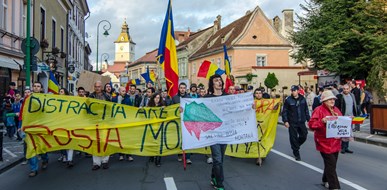Stephanie Triefus wins 2025 Praemium Erasmianum Dissertation Prize
Published 5 June 2025
Protests for Rosia Montana by davidionut on Istock
Asser Institute researcher Stephanie Triefus has been named one of the winners of the 2025 Praemium Erasmianum Dissertation Prizes. The award, granted by the Praemium Erasmianum Foundation, is one of the most prestigious honours for PhD research in the Netherlands.
Canadian mining investors arrived in the Romanian mountain village of Roșia Montană, planning to build Europe’s largest open-pit gold mine. Residents resisted the project for years, citing environmental risks, cultural heritage loss, and deepening divisions in the community. As opposition escalated into a national protest movement, the Romanian government eventually withdrew its support.
However, the dispute did not end there. The mining company initiated arbitration proceedings against the Romanian state, alleging violations of bilateral investment treaties. When the case reached an international tribunal in Washington, the voices of those who had long defended their land and livelihoods were largely absent from the proceedings.
Marginalised voices
Triefus’s research, International Investment Law from Below: Taking Local Community Rights Seriously, investigates how foreign investment disputes, particularly in the mining sector, often marginalise the voices of the people most affected. While these legal disputes are formally between investors and states, the consequences often fall hardest on communities, who are treated as bystanders rather than rights holders. Triefus’ study offers a detailed analysis of how this dynamic plays out in practice, using the Roșia Montană case to illustrate broader systemic issues.
“International law tends to recognise states and investors, but often ignores the people living on the ground,” Triefus said. “I am grateful that this award recognises the importance of bringing those perspectives to the centre of legal debates.”
Her research challenges the assumption that states always act in the interests of their people. It shows how investor-state arbitration can undermine democratic decision-making, chill government action, and exclude the very communities whose lives are most affected. By foregrounding their stories, Triefus argues for a more inclusive and accountable system, one that sees beyond contracts and compensation to consider human rights, participation, and justice.
Christophe Paulussen, acting academic director of the Asser Institute, praised the work: “This prestigious prize is a well-deserved recognition for Stephanie’s excellent and important thesis, which was already defended cum laude. Her research challenges us to think more seriously about justice for communities affected by corporate power.”
About Stephanie Triefus

Stephanie Triefus is a researcher at the T.M.C. Asser Instituut and the academic coordinator of the Netherlands Network for Human Rights Research. Her research interests include business and human rights, climate change and international economic law. Stephanie received her PhD cum laude from Erasmus University Rotterdam. Her research concerned international investment law and the participatory rights of people affected by foreign investment projects. This project took a critical approach to international law and employed qualitative empirical legal research.
About the Praemium Erasmianum Foundation
The Praemium Erasmianum Foundation is a Dutch cultural institution, established in 1958 by Prince Bernhard of the Netherlands. Drawing on the humanist ideals of Desiderius Erasmus, the foundation seeks to enhance the position of the arts, social sciences, and humanities.
Since 1988, the foundation has annually awarded the Dissertation Prize to early-career researchers who have completed outstanding PhD theses in humanities, social sciences, or law at Dutch universities. Each year, up to five prizes are presented, each comprising €3,000 and a certificate.
Read more
[New blog post] More than a verdict: Local perspectives on the Pakistan Reko Diq dispute
In a new blog post on the Business and Human Rights Journal blog, authors Asif Khan, Dmytro Cherneha and Stephanie Triefus argue that the arbitration case between the Australian copper company Tethyan v. Pakistan has largely overlooked local perspectives, prioritising resource development over the well-being of affected communities. Read more.
[Blog post] Should mandatory human rights due diligence be based on social expectations?
Asser Institute researcher Antonio Guzmán Mutis examines the definition basis of corporate responsibility in a new blog post. Should corporate responsibility continue to rely on industry expectations, or should mandatory due diligence laws be rooted in human rights justifications? Read more.
